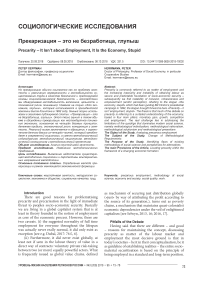Precarity - it isn’t about Employment, it is the Economy, Stupid
Автор: Herrman Peter
Журнал: Уровень жизни населения регионов России @vcugjournal
Рубрика: Социологические исследования
Статья в выпуске: 3 т.14, 2018 года.
Бесплатный доступ
Precarity is commonly referred to as matter of employment and the increasing insecurity and instability of obtaining labour as secure and predictable foundation of socio-economic security - subsequently we find instability of inclusion, cohesiveness and empowerment (and/or perception). Alluding to the slogan «the economy, stupid» which had been guiding Bill Clinton’s presidential campaign in 1992, the slogan brought forward is here «Precarity - it isn’t employment, stupid». The thesis is that much of the debate on precarity is referring to a curtailed understanding of the economy, based in four main pillars: monetary gain, growth, competition and employment. The real challenge lies in addressing the limitations of the quadriga that dominates modern social science, namely methodological individualism, methodological nationalism, methodological solutionism and methodological presentism. The Object of the Study. Analysing precarious employment The Subject of the Study. Change of Methodological Requirements The Purpose of the Study. Identifying flaws of existing methodology of social science and perspectives for alternatives The main Provisions of the Article. Locating precarity within the framework of a changing economic formation
Precarious employment, methodology of social science, economy and society, social quality, work
Короткий адрес: https://sciup.org/143173706
IDR: 143173706
Список литературы Precarity - it isn’t about Employment, it is the Economy, Stupid
- Bhaduri, Amit, 1969: On the Significance of Recent Controversies on Capital Theory: A Marxian View; in: The Economic Journal, Vol. 79/315 (September); 532-539; here: 533; Published by Blackwell Publishing for the Royal Economic Society; http://www.jstor.org/stable/2230380; 30/06/2012 16:10
- Boyer Robert/Saillard, Yves [eds.], 2002: Régulation Theory. The State of the Art; London/New York: Routledge
- Cox, Robert W., 1981: Social Forces, States and World Orders: Beyond International Relations Theory; in: Millennium - Journal of International Studies 1981; 10; 126-155 DOI: 10.1177/03058298810100020501
- Dieuaide, Patrick, 2018: Grey Zones and Triangulation of the Employment Relationship in Globalisation: A Business Policy Approach; in: Transfer. European Review of Labour and Research; Vol. 24, Issue 3; 297 - 315; DOI: 10.1177/1024258918775533
- Drahokoupil, Jan/Piasna, Agnieszka, November 23, 2017: Work in the Platform Economy: Beyond Lower Transaction Costs; in: Intereconomics: Review of European Economic Policy, 52, November/December: 335-340; DOI; available at SSRN: https://ssrn.com/abstract=3076472; 21/08/18 DOI: 10.1007/s10272-017-0700-9


